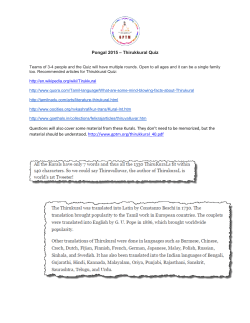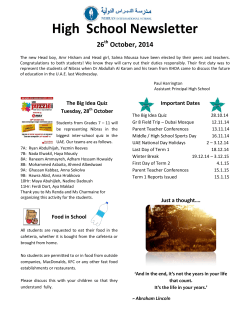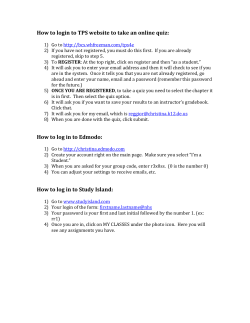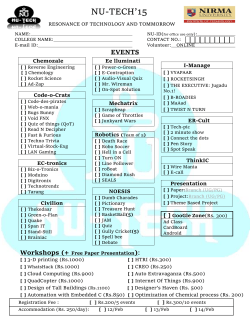
GEOG330I: As the World Turns: Society and Sustainability in a Time
GEOG330I: As the World Turns: Society and Sustainability in a Time of Great Change Summer 2015, 7/13 – 7/31; Online through Canvas. Instructor: Dr. Rachel Berndtson, rberndts@umd.edu Teaching Assistant: Emma Minnis, eminnis8@gmail.com Course description “As the World Turns” was an American soap opera which captivated thousands of viewers from 1956 to 2010. During that time it reflected the changing societal norms, and adapted its content and format to be sustainable in the broadcast industry. It seems like an apt metaphor for this I course since we will be looking how societies cause and adapt to the changing social and environmental landscapes. Society and sustainably are like conjoined twins, a movement in one triggers a movement in the other. Issue of current importance Sustainability is a ‘hot topic’ and the word is over-used. In this course you will develop your own definition of sustainability as you look at it across cultures and physical environments. Sometimes there is conflict when there must be a choice between sustaining a culture and sustaining a particular environmental system. You will be analyzing how and why environmental choices are made. You will be looking at why environmental change is spatially distributed, and examine how sustainability decisions are made within societies on multiple scales and by multiple cultures. Learning outcomes: I-Series goals: • Students will be able to identify how sustainability, both of societies and the environment, is one of the most significant issues in the world today. • Students will be able to describe the sources experts use to explore the relationship between society and sustainability, including geographic methods, techniques and theories. • Students will demonstrate an understanding of concepts and approaches of sustainability of societies on different scales, examining local, regional and worldwide issues. • Students will demonstrate an understanding of the dimensions sustainability, including cultural, environmental, economic, and political systems • Students will communicate major ideas and issues on society and sustainability through reflection activities, individual essays, and discussion on essay presentations. Social Science goals: • Students will demonstrate knowledge of the fundamental concepts and ideas surrounding society and sustainability, including climate change, development, politics, economy, and demography. • Students will demonstrate critical thinking in evaluating the casual arguments surrounding society and sustainability in order to analyze concepts of change, sustainability, resilience, metamorphosis and extinction. • Students will understand how culture evolves spatially and temporally and the impact these evolutions have on individuals’ perceptions, actions and values. • Students will be able to analyze contemporary issues such as climate change, development, politics, economy, and demography in order to develop their own policies for social change. Plural Societies goals: • Students will be able to understand the basic concepts of society and sustainability from a geographic perspective. • Students will learn about the tension between the desire to be ethnocentric and the reality of plural societies to cope with the stresses of social and environmental change. • Students will be able to analyze various forms and traditions of culture as the basic building blocks to the cultural and environmental sustainability of societies. • Students will use a comparative framework to examine the experiences, cultures and histories of societies at different geographic scales and temporal scales to understand various methods of sustainability. Grades: Lecture quizzes = 20 quizzes worth 5 points each. (100 points total) Reflection activities = 9 activities worth 10 points each (90 points total) Term papers = 3 papers worth 75 points each (225 points total) Term paper presentation = 1 presentation worth 25 points Term paper presentation peer review = 1 peer review worth 5 points TOTAL POINTS: 445 Structure of the course This course is held online, which means you can complete the work at your convenience during the day or night. All course materials can be accessed through the UMD Canvas site, found at www.umd.instructure.com. Each week we will have roughly 8 lectures, and they appear in numeric order. Each lecture is pre-recorded and streamed over Canvas. After you listen to the lecture, complete the quiz for that lecture. You will not be able to access the next lecture without completing the previous lecture’s quiz. All due dates/times for this course are based on Eastern Standard Time (EST). This three-week summer course moves at a very fast pace. Although you may complete the assignments at your own pace each week, I highly recommend following the suggested agenda posted below. Waiting until the last minute to submit an assignment or take a quiz not only jeopardizes the quality of the work, but also my ability to respond to questions. I try to respond to emails within 24 hours on weekdays. I will not be available to respond to questions within hours of an assignment’s due date. Complete assignments before or based on the agenda suggested below to ensure feedback. Office hours I will be available from 9-10am each Tuesday and Thursday for office hours. Office hours are held virtually through Google Chat. I will use the Google Chat screenname: “geogberndtson.” Send a chat request to my account or send an email to geogberndtson@gmail.com, and I will request you. Visit: https://support.google.com/chat/answer/161880 for more information on enabling Gchat. Office hours are the best way to ensure a rapid response to your questions and concerns. I am happy to review quiz questions, reflection activities, upcoming term papers, and other assignments through office hours. I encourage you to attend! I look forward to meeting you through office hours. Required software and hardware You are required to have access to a computer with speakers and a microphone, and a broadband internet connection. The browser you use must have the Flash plugin installed. It is your responsibility to ensure your browser and computer can stream the lectures from Canvas. Faulty internet and/or computer access are not acceptable excuses for not completing the work on time. I recommend you follow the suggested agenda for viewing lectures posted below. Waiting until the last minute to view lectures means risking that your computer and internet access work as planned. Personal Computers (PC) and the Internet Explorer browser are the most compatible with the streaming lectures. Mac computers and other internet browsers can be compatible with the lectures, but require additional plug ins. It is your responsibility to make sure these are working to view lectures. The lectures are available in several formats: PowerPoint files, .wmv files and .mp4 files. The .wmv files play on PCs and on some Macs. Some Macs will automatically convert the .wmv to a compatible video file. The .mp4 files play on Macs using the VLC media player. It can be downloaded for free here: http://www.videolan.org/vlc/index.html (Links to an external site.). VLC should be able to both play .wmv files on a Mac and convert .wmv files on a Mac to MPEG-4 files. Before you sign up for this class, test these different media players and files on your computer! Contact ELMS and OIT with help on technical problems: http://www.elms.umd.edu/page/student-support http://www.it.umd.edu/students.html Make-up Work This course “meets” every day for 3 weeks. This equates to roughly 8 hours of work a day. It is absolutely essential to keep up with the class and to complete all the work every day. Late work will not be accepted. For all assignments uploaded to Canvas (discussion activities, term papers, presentations) or completed through Canvas (quizzes, peer reviews), do not submit at the last minute. Some internet connections are slower than others, and the network can slow when many people are trying to submit simultaneously. It is your responsibility to ensure your assignment is completed and uploaded before the due date and time. This might mean starting your upload at least 30 minutes before it is due. In the case that the upload fails, send your assignment to me and your TA as an email attachment BEFORE the due date and time. We will check the last edit time on the document. NO LATE SUBMISSIONS WILL BE ACCEPTED. Accommodations If you have disabilities, learning or otherwise, visit the Disability Support Office to fill out appropriate forms that will tell me what accommodations to make. Since you know now when papers are due for the semester, I will expect everyone to turn them in on time on the same day. These forms will not be accepted after the second day of the course. Please talk to me about what arrangements are necessary to allow you to learn the content of the course. I will make every effort to accommodate students who are registered with the Disability Support Services (DSS) Office and who provide me with a University of Maryland DSS Accommodation form which has been updated for the current semester. Academic integrity Academic dishonesty is a serious offence that can result in suspension or expulsion from the University of Maryland. Please refer to the following website to determine how the University of Maryland defines plagiarism and academic dishonesty -http://www.testudo.umd.edu/soc/dishonesty.html. Plagiarism is the use of another person’s work as if it was your own and will not be tolerated. If I believe that there has been plagiarism on an assignment, I will inform you of my determination and you will receive a zero for the assignment. Cases will be referred to the Student Conduct Office. Lectures Lectures are prerecorded and posted on Canvas. Each lecture can be found under the “modules” section. The lectures for each week will be posted at 8:00am on the following dates (7/10, 7/17, 7/24). After you listen to the lecture, complete the quiz for that lecture. You will not be able to access the next lecture without completing the previous lecture’s quiz. Readings Materials that correspond with each lecture should be read BEFORE you watch that lecture. Several reflection activities will require you reference the reading materials. We will use one primary text and several articles as reading materials. The text is available at the University of Maryland Book Center: Whitehead, Mark 2007. Spaces of Sustainability (NY:Routledge). You can order it new or used from your choice of book providers. The digital version is also acceptable. Quizzes Quizzes evaluate your active viewing of the lectures. Quiz questions are not difficult. There are 20 quizzes at five points each. You will have four minutes to complete each quiz after opening it. You must complete the quiz for the corresponding lecture BEFORE you can access the next lecture. I recommend taking the quiz right after viewing the lecture so the material is fresh. Weekly quizzes are due by 11:55pm on 7/17, 7/24, and 7/31. Reflection Activities Reflection activities are an opportunity to apply lecture concepts to real world case studies and voice your opinion on the issues. There are nine reflection activities worth ten points each. You will complete reflection activities in preassigned teams of three students. Each week, one team member will be the reflection activity team leader for all the RAs of that week. The team leaders for each week will go by alphabetical order of your last names. The first week’s team leader may have to be so twice if a team member drops the course mid semester. RAs will be available on ELMS each week at 8am (7/10, 7/17, 7/24). RA teams have their own shared space on ELMS through which to collaborate on a common team document. The team leader for that week is responsible for setting up a collaboration Google Doc for all of that week’s RAs. Review the following materials to learn how to (1) enable Google Docs on your Canvas accounts, and (2) start a group collaboration using Google Docs through Canvas. Teams can also share files and have discussions. RA team members who are not the leader for that week will submit RA responses to the team Google Doc by 11:55pm on that week’s RA response to the team leader due date (7/15, 7/22, 7/29). The team leader will consolidate and fill in remaining RA responses to post back on the shared Google Doc by 11:55pm the following day (7/16, 7/23, 7/30). Non-team leaders will then have between 11:55pm on those dates (7/16, 7/23, 7/30), and 1:00pm the next day (7/17, 7/24, 7/31) to submit any additional comments or revisions to the RA team leader. RA team leaders will make any additional changes and upload the final team RA as an ELMS assignment by 11:55pm on the final due date (7/17, 7/24, 7/31). This final assignment submission will require the team leader to convert the working Google Doc to a permanent file for upload. Team members will receive the same grade, and each person must contribute. If a team member did not contribute, others can note such on the reflection activity, and points will only be deducted for the non-contributing team member. RA timelines: Week RA RAs available Team leader creates Google Doc by: 1 1-3 7/10, 8:00am 7/13, 11:55pm 2 4-6 7/17, 8:00am 7/20, 11:55pm 3 7-9 7/24, 8:00am 7/27, 11:55pm Non-team leader responses due to Google Doc by: 7/15, 11:55pm 7/22, 11:55pm 7/29, 11:55pm Team leader responses due to Google Doc by: 7/16, 11:55pm 7/23, 11:55pm 7/30, 11:55pm Last chance to edit Google Doc 7/17, 1:00pm 7/24, 1:00pm 7/31, 1:00pm Team leader upload final RAs to ELMS 7/17, 11:55pm 7/24, 11:55pm 7/31, 11:55pm Term Papers This course includes three term papers that apply your knowledge about society and sustainability to critically analyze issues. Papers should incorporate information from lectures and readings, scholarly sources, and your own reflection. Term papers are due (uploaded to Canvas) by 11:55pm each week (7/16, 7/23, 7/30). Each paper is worth 75 points. All three papers must meet the following conditions: Pages #s Six page minimum for paper content, with: o At least five consecutive pages of text, at least one page of photos, tables, figures Not included as one of the six pages of paper content: o One (or more if needed) page for citations o One title page with name, date, paper title (do not repeat this information on the first page of text content). Styling Double spaced Times New Roman size 12 font 1 inch margins, 0 point spacing before and after paragraphs Numbered pages Saved as “Last Name_First Name_Paper1” (ex: Berndtson_Rachel_Paper1). Citations AAG style citations Minimum of two scholarly sources in each paper. If you are unsure of whether a source is considered scholarly, consult your TA at least 24 hours before the paper is due. Paper presentations Each student will make one voice-recorded presentation to accompany one of the three term papers. The week/paper for which you are required to create a presentation is preassigned. You may use any audio/visual recording method to create your presentation. Some options include: voice recorded PowerPoint (https://www.youtube.com/watch?v=3uk4CU7uobM), iMovie, Windows Movie Maker, Prezi. If voice recorded PowerPoint, you will need to save your PowerPoint as a video file, .wmv, .mpeg, etc. (https://support.office.com/en-au/article/Turn-your-presentation-into-a-video-c140551f-cb37-4818-b5d43e30815c3e83). To submit the assignment, upload the presentation to YouTube and publish the link, then submit your presentation as a LINK TO THE PUBLISHED YOUTUBE CLIP through Canvas. For information on how to upload a YouTube video, see: https://support.google.com/youtube/answer/57924?hl=en&ref_topic=2888648. Presentations are due by 11:55pm (on either 7/16, 7/23, 7/30), and are worth 25 points. Presentations must meet the following conditions: Information to include: o Introduction: introduce yourself and the topic of your paper. o Major findings: explain the most important or relevant findings from your research. o Analysis: were you surprised by your research findings? What is the most important take away message, and why? Will you change your behavior or perception? If so, how? o Conclusion: what are your future recommendations? More research? New policies? More public outreach? Formatting: o A minimum of five, and a maximum of seven minutes of total recording. This does not mean 5-7 minutes of recording per topic. Presentations are meant to provide a concise summary of your findings. Points will be detracted for going over the total time limit. o Include your name o At least 2 pictures o At least 1 map of an area referenced in your presentation o Submitted as a published YouTube link. Sign out of your YouTube account and make sure the link works before submitting. Paper presentation peer reviews: In addition to submitting one presentation, you must review one of your peers’ presentations. You will only be assigned a peer’s presentation to review if you turned in a presentation of your own. Your review may be your own reflections, reactions, or questions based on your viewing. In order to get full points, your review must reflect that you have viewed the presentation by referencing a specific part of the presentation. Reviews will be due by 11:55pm on their due dates (either 7/17, 7/24, and 7/31). You will not have points deducted if the student whose presentation you are assigned to review did not submit his/her presentation. All reviews must meet the following conditions: At least 60 words At least one reference to a specific component (fact, statement, picture, etc.) of the presentation you are reviewing. Respectful language. Reviews that are hateful or otherwise disrespectful will result in a grade of ZERO for your own paper, presentation, and presentation reviews, and your name will be sent to the undergraduate ethics board on campus. RA Team 1-3 4-6 7-9 Presentation topic Term paper 1: greenwashing Term paper 2: mountain-top mining Term paper 3: sustainability plan Presentation due date 11:55pm, 7/16 11:55pm, 7/23 11:55pm, 7/30 Peer review due date 11:55pm, 7/17 11:55pm, 7/24 11:55pm, 7/31 Extra credit blog: You can earn extra credit points by posting to our course “sustainability” blog. Use the blog to post instances of “sustainability” you come across in everyday life. These may include photos you take, news articles, online memes, tweets, etc. that you see claiming to be "green" or "sustainable." With each post, include two to three sentences explaining (1) what message you think is conveyed, and (2) how you might critically question the "sustainability" of the message. Each post = .5 extra credit points. You are limited to getting points for one post each weekday. Responding to or commenting on someone else’s post = .2 extra credit points. Responses should be in the form of your personal reaction, a question, a reflection, or an additional link, picture, etc. you think relates to the original post (IE: must be more substantive than “that is interesting,” or “I agree/disagree.” A more substantive comment could be “I agree, because….[enter you rationale].”). You are limited to getting points for one response each weekday. Intro Recommended schedule: I highly recommend following the schedule below. Although you have some flexibility on when you watch the lectures and complete quizzes, reflection activities, papers, presentations, and peer reviews each week, there are mandatory deadlines for all those course activities. These are in bold under the assignment column below. Date Lectures Readings Assignments Intro and Agriculture materials available 8:00am 7/10/15. 7/13 Course Introduction GEOG330 Syllabus Quiz 1 Due by 11:55pm RA Team leaders create Google Docs for RAs 1-3 (and invite team members) 7/13 Sustainability and Whitehead: Chapter 1 Quiz 2 Society 7/13 Sustainability across Whitehead: Chapter 6 Quiz 3 Scales 7/14 Pro-environmentalism Kollmus & Ageyman Quiz 4 2002 EHP 2010 7/14 Local Sustainability Middlemiss 2010. Quiz 5 Whitehead: Chapter 8 7/15 Industrial Agriculture DeLind 2010 Quiz 6 7/15 7/15 Sustainable Agriculture Community Agriculture Saldivar-Tanaka & Krasny 2004 7/16 Agriculture 7/17 Water Energy Energy and Water materials available 8:00am 7/17/15 7/20 Global Energy EIA China 2014:1-3,612,28-30 IEA 2014 Shealy & Dorian 2010 7/21 Nonrenewables 7/21 Renewables Panwar et al 2011 7/22 Global Water Crisis BOA 2014: 3-8, 11-30, 38-44 7/22 Water Scarcity BOA 2014: 31-37 7/23 Coastal Cities Quiz 7 Quiz 8 Due by 11:55pm Non-team leaders: RAs 1–3 responses Google Docs Due by 11:55pm: Paper 1 Presentation (RA teams 1-3 only) Team leaders: RAs 1-3 responses Google Docs Due by 1:00pm Non-team leaders: last chance edits RAs 1-3 Due by 11:55pm: Peer review (RA teams 1-3 only) Quizzes 1-8 Final RAs 1-3 (uploaded by team leader) Quiz 9 Due by 11:55pm RA Team leaders create Google Docs for RAs 4-6 (and invite team members) Quiz 10 Quiz 11 Quiz 12 Quiz 13 Due by 11:55pm Non-team leaders: RAs 4-6 responses Google Docs Quiz 14 Due by 11:55pm: Paper 2 Presentation (RA teams 4-6 only) Team leaders: RAs 4-6 responses on Google Docs Due by 1:00pm Non-team leaders: last chance edits on RAs 4-6 Due by 11:55pm: Peer review (RA teams 4-6 only) Quizzes 9-14 Final RAs 4-6 (uploaded by team leader) 7/24 Urbanization Urbanization and Industry materials available 8:00am 7/24/15. 7/27 Global Urbanization 7/28 7/28 Urban Challenges Urban Solutions 7/28 Urbanization and Cultural Sustainability Industry and Development Overview Industry, Development, and Sustainability 7/29 7/29 7/30 Industry 7/31 Seto et al 2010 Wang et al 2012 Pierce et al_2011 Wellman 2001 Kaya 2005 Whitehead: Chapter 4 Brenner 2014 Kirchain & Olivetti 2013 China Water Risk 2011 Quiz 15 Due by 11:55pm RA Team leaders create Google Docs for RAs 7-9 (and invite team members) Quiz 16 Quiz 17 Quiz 18 Quiz 19 Quiz 20 Due by 11:55pm Non-team leaders: RAs 7-9 responses Google Docs Due by 11:55pm: Paper 3 Presentation (RA teams 7-9 only) Team leaders: RAs 7-9 responses on Google Docs Due by 1:00pm Non-team leaders: last chance edits on RAs 7-9 Due by 11:55pm: Peer review (RA teams 7-9 only) Quizzes 15-20 Final RAs 7-9 (uploaded by team leader)
© Copyright 2025









